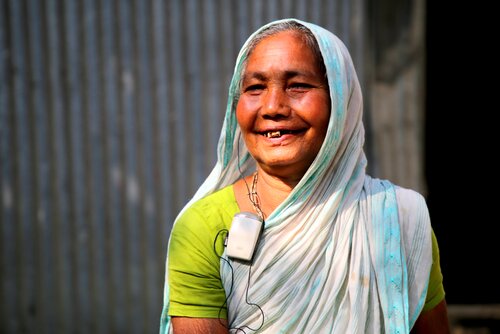New analysis for country teams: Perspectives of 52...
24 October 2019
A UHC2030 Partner Insight written by Humanity & Inclusion

Humanity & Inclusion (HI, also known as Handicap International) officially joined UHC2030 in May 2019. This Partner Insight is from Humanity and Inclusion's perspective.
Joining UHC2030
"HI recognized the strong alignment of UHC2030’s objectives with HI’s mission of working alongside persons with disabilities and vulnerable populations to improve their living conditions and respect their fundamental rights. With more than 35 years of experience, HI has been an active partner in the global health community improving access to mainstream and specific services, promoting the participation of persons with disabilities, and ensuring equal opportunities. Joining UHC 2030 represents a unique opportunity for HI to work closely with other committed actors in taking forward the agenda of Health System Strengthening and ensuring that no one is left behind in this process, in particular vulnerable populations and persons with disabilities.
Persons with disabilities experience higher health needs and barriers to access information and services
"Persons with disabilities often have more healthcare needs than persons without disabilities. While the general health needs of persons with disabilities are the same as everyone else and can often be met by primary healthcare services, they may also have additional specific health needs related to specific impairments or comorbidity. These include access to rehabilitation and assistive devices (such as wheelchairs, prosthesis, visual supports).
"Despite the higher needs, persons with disabilities often encounter barriers to accessing health services, including physical, communication, attitudinal and financial barriers. Persons with disabilities are two times more likely to find health care providers’ skills and facilities inadequate, three times more likely to be denied health care, and four times more likely to be treated badly in health care facilities.
"For example, the gap between public health needs and access to HIV prevention, screening and care for persons with disabilities, combined with stigma, discrimination and social exclusion, translates into a higher prevalence of HIV among persons with disabilities. Women with disabilities are three to four times more likely to be HIV-positive than women in the general population. 50% of persons with disabilities cannot afford healthcare, facing a 50% higher risk of facing catastrophic healthcare costs than people without disabilities.
“After my traffic accident, I had hard time finding a job. […|It was my nephews who funded a large part of my rehabilitation care, about 347 USD. I would like to do more rehabilitation sessions, but I have no means of financing”. Pierre R., Haiti, June 2018
"These costs can be related to general household expenses, such as transport or health expenditure, but may also be associated with rehabilitation and assistive devices. Or they relate to the need for household members, in most cases women, to give up income- generating activities to provide care otherwise unavailable. For children, who need to change or adapt their assistive devices more frequently as they grow up, costs can be even higher.
"Health insurance is a common mechanism for decreasing financial barriers to health services, yet persons with disabilities often face barriers accessing private health insurance schemes, including lack of accessible information and discriminatory policies due to pre-existing conditions. In addition, inclusion of rehabilitation services and products in insurance coverage is very variable or absent in most low-income countries.
Calling for inclusion of persons with disabilities
"As countries work towards achieving universal health coverage (UHC), it is important that UHC policy and programming take into full consideration the need of persons with disabilities through more robust, more gender, age and disability inclusive health insurance systems. We need to ensure that everyone receives, without financial hardship, effective and quality health services according to their needs, including rehabilitation services and assistive products.
"To achieve this goal, the participation of persons with disabilities and their representative organizations in the design, implementation, monitoring and evaluation of UHC policies and programming is essential. Building the capacity of health service providers on disability inclusive health and ensuring information about health coverage systems are fully accessible for everyone is also essential.
"Disability-specific services and rehabilitation, which is important not only for persons with disabilities but for those living with a wide range of health conditions, should be part of the priority package of care and covered by financial risk protection mechanisms. Although the Declaration of Astana (2018) reaffirms strong basis for integrating rehabilitation in the UHC agenda, rehabilitation is still largely perceived as a luxury service and is rarely integrated in health-financing solutions.
"I am 22 years old and mom of a 11-month-old boy. To pay for membership in the rehabilitation center, I sold my furniture. I live 30 minutes’ walk from the center, but I come by tuk-tuk for 4 000 AR round trip. I spend about 37 000 AR a month, which corresponds to 20 kilos of rice”. Julia N., Madagascar, May 2018
"The Report Rehabilitation for the realisation of human rights and inclusive development, recently published by HI and the Global Rehabilitation Alliance, wants to challenge this misconception, by illustrating the impact of rehabilitation on individuals, communities and the society at large and by showing rehabilitation’s essential contribution to achieving SDG 3 among others."
About Humanity & Inclusion
Humanity & Inclusion is an independent and impartial aid organisation working alongside persons with disabilities and vulnerable populations in situations of poverty and exclusion, conflict and disaster. The HI network is composed of a Federation which implements our programmes in in around sixty low- and middle-income countries and of eight national associations. These programmes or national associations are known as "Handicap International" or "Humanity & Inclusion", depending on the country.
Photo credit: Farid Khan/HI
